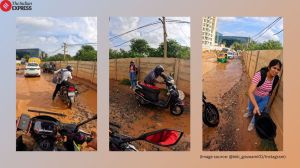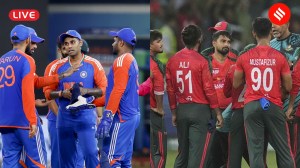Time to put a price tag to Karnataka’s contempt
After all the star wars, the shouting and fasting, Tamil Nadu is faced with the stark reality that there is no Cauvery water because the tri...

After all the star wars, the shouting and fasting, Tamil Nadu is faced with the stark reality that there is no Cauvery water because the tribunal set up for the purpose had not evolved a workable ‘‘distress formula’’ for sharing waters during the years when rain gods fail. This is typical of the rot in Indian governance— a laidback approach even on matters of extreme sensitivity to the nation and its people. Our political leadership, and most of our ‘‘professional’’ breed of administrators, are all ‘‘fair weather’’ birds who fold up at the slightest sign of crisis since they have simply not planned in advance for any crisis management.
One does not need a Cauvery tribunal or a river authority for apportioning water during a normal year when the reservoirs are full to the brim. The upper riparian state will release the required water, sometimes even more than that, if only to ward off possible floods. So if water is flowing into the Mettur dam during normal times, it has nothing much to do with the tribunal formula or the river monitoring authority.
The mettle of the CRA or the tribunal is tested during the years of distress. So is the sagacity and maturity of the political leadership of Tamil Nadu and Karnataka. The test failed on both fronts this year. So the matter has been taken to two extremes—the streets and the apex court. Both evoked a good response for the lower riparian state of Tamil Nadu.
The Supreme Court has twice ordered a ‘‘distress sharing’’ arrangement. On August 3, the Court directed Karnataka to release 1.25 tmc ft of water a day to Tamil Nadu. Subsequently on September 7, CRA ordered a reduced flow of 0.8 tmc ft a day. Karnataka did not comply with this order. On October 4, the Supreme Court issued a second order that the Karnataka Government must release the water determined by CRA until the authority came up with a revised directive.
And on Tamil Nadu’s streets, cinema stars ‘‘blockaded’’ Neyveli power and put themselves to ‘‘distress’’ by fasting! Yet the delta farmers, who are eating rats to survive, have not received one cusec of Cauvery water.
If this distressing situation continues, not only the famished farmers and labourers of the delta, but also the people of the nation will lose all faith in the due process of law. Karnataka has to compensate the affected farmers if not with water, in a different form. They should also make up for the loss of employment for the poor labourers. This can come in the shape of grains and other commodities of daily use to families of this rural populace.
Two high-level Government of India committees have assessed the extent of loss and the distress suffered by the delta population, both farmers and labourers. Karnataka should share this distress through proportionate relief in the form of grain and clothing. Obviously, Karnataka will neither be willing nor capable of providing this solace. So the Centre or the Supreme Court should step in and exercise the extraordinary powers they are vested with.
The details need to be worked out. But a broad outline could be indicated. Based on the assessment of distress, the quantum of relief-food and clothing for the farmers and agricultural labour could be worked out. This can be provided in kind from the FCI godowns (food) and Khadi Board outlets (clothing). State machinery and NGOs can be utilised to speedily disburse the relief before the misery of the suffering people breaches tolerable limits.
The cost of the entire relief package should be billed to Karnataka Government and they should be asked to pay up within a specified time frame. If they fail to do so, the Centre should ask the Reserve Bank of India to make good the payment to the FCI and Khadi Board and credit the same to Karnataka’s account. The Government should submit this proposal to the Supreme Court and obtain its approval in the next hearing.
This ‘‘distress sharing’’ formula could be a win-win situation. First, it will establish the principle of ‘‘defaulter pays’’ in line with the concept of ‘‘polluter pays’’ in environmental management. Second, the farmers and labourers of the delta will get immediate measurable and usable relief. Third, the vast stocks of FCI and Khadi Board would have found a fruitful and humane outlet. Finally, Karnataka would have learnt its lesson that wanton defiance does not pay—instead the government has to pay for it!
(The writer is a former IAS officer)
Photos


- 01
- 02
- 03
- 04
- 05





























